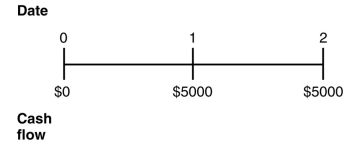Exam 4: The Time Value of Money
Exam 1: The Corporation38 Questions
Exam 2: Introduction to Financial Statement Analysis103 Questions
Exam 3: Financial Decision Making and the Law of One Price89 Questions
Exam 4: The Time Value of Money91 Questions
Exam 5: Interest Rates68 Questions
Exam 6: Valuing Bonds115 Questions
Exam 7: Investment Decision Rules86 Questions
Exam 8: Fundamentals of Capital Budgeting95 Questions
Exam 9: Valuing Stocks96 Questions
Exam 10: Capital Markets and the Pricing of Risk103 Questions
Exam 11: Optimal Portfolio Choice and the Capital Asset Pricing Model134 Questions
Exam 12: Estimating the Cost of Capital104 Questions
Exam 13: Investor Behavior and Capital Market Efficiency77 Questions
Exam 14: Capital Structure in a Perfect Market99 Questions
Exam 15: Debt and Taxes95 Questions
Exam 16: Financial Distress,managerial Incentives,and Information111 Questions
Exam 17: Payout Policy96 Questions
Exam 18: Capital Budgeting and Valuation With Leverage99 Questions
Exam 19: Valuation and Financial Modeling: a Case Study49 Questions
Exam 20: Financial Options57 Questions
Exam 21: Option Valuation43 Questions
Exam 22: Real Options64 Questions
Exam 23: Raising Equity Capital52 Questions
Exam 24: Debt Financing54 Questions
Exam 25: Leasing46 Questions
Exam 26: Working Capital Management48 Questions
Exam 27: Short-Term Financial Planning47 Questions
Exam 28: Mergers and Acquisitions59 Questions
Exam 29: Corporate Governance46 Questions
Exam 30: Risk Management53 Questions
Exam 31: International Corporate Finance45 Questions
Select questions type
Your son is about to start kindergarten in a private school.Currently,the tuition is $12,000 per year,payable at the start of the school year.You expect annual tuition increases to average 6% per year over the next 13 years.Assuming that your son remains in this private school through high school and that your current interest rate is 6%,then the present value of your son's private school education is closest to:
(Multiple Choice)
4.9/5  (42)
(42)
Suppose that a young couple has just had their first baby and they wish to insure that enough money will be available to pay for their child's college education.They decide to make deposits into an educational savings account on each of their daughter's birthdays,starting with her first birthday.Assume that the educational savings account will return a constant 7%.The parents deposit $2000 on their daughter's first birthday and plan to increase the size of their deposits by 5% each year.Draw a timeline that details the amount that would be available for the daughter's college expenses on her 18th birthday.
(Essay)
4.7/5  (34)
(34)
At an annual interest rate of 7%,the present value of $5000 received in five years is closest to:
(Multiple Choice)
4.9/5  (36)
(36)
At an annual interest rate of 7%,the present value of this timeline in year 0 is closest to:
(Multiple Choice)
4.8/5  (32)
(32)
Use the following information to answer the question(s)below.
Your great aunt Matilda put some money in an account for you on the day you were born.This account pays 8% interest per year.On your 21st birthday the account balance was $5033.83.
-The amount of money that your great aunt Matilda originally put in the account is closest to:
(Multiple Choice)
4.8/5  (40)
(40)
Use the figure for the question(s)below.  -Which of the following statements regarding timelines is FALSE?
-Which of the following statements regarding timelines is FALSE?
(Multiple Choice)
4.8/5  (26)
(26)
You work for a pharmaceutical company that has developed a new drug.The patent on the drug will last for 17 years.You expect that the drug will produce cash flows of $10 million in its first year and that this amount will grow at a rate of 4% per year for the next 17 years.Once the patent expires,other pharmaceutical companies will be able to produce generic equivalents of your drug and competition will drive any future profits to zero.If the interest rate is 12% per year,then the present value of producing this drug is closest to:
(Multiple Choice)
4.9/5  (37)
(37)
If the current rate of interest is 8% APR,then the future value of an investment that pays $500 every two years and lasts 20 years is closest to:
(Multiple Choice)
4.8/5  (45)
(45)
Use the information for the question(s)below.
Assume that you are 30 years old today,and that you are planning on retirement at age 65.Your current salary is $45,000 and you expect your salary to increase at a rate of 5% per year as long as you work.To save for your retirement,you plan on making annual contributions to a retirement account.Your first contribution will be made on your 31st birthday and will be 8% of this year's salary.Likewise,you expect to deposit 8% of your salary each year until you reach age 65.Assume that the rate of interest is 7%.
-The present value (at age 30)of your retirement savings is closest to:
(Multiple Choice)
4.9/5  (33)
(33)
Which of the following statements regarding the timeline is TRUE?
(Multiple Choice)
4.9/5  (39)
(39)
Showing 81 - 91 of 91
Filters
- Essay(0)
- Multiple Choice(0)
- Short Answer(0)
- True False(0)
- Matching(0)